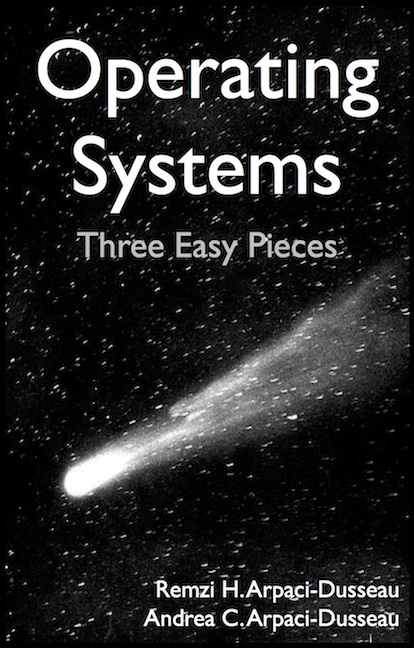Latest Announcements
- 12/07: Lecture 23 is posted
- 12/05: Lecture 22 is posted
- 11/29: Lecture 21 and homework 5 are posted
- 11/28: Lecture 20 is posted
- 11/27: Homework 4 solution is posted
- 11/15: Lecture 19 is posted
- 11/14: Lecture 18 is posted
- 11/07: Lecture 17 and homework 4 are posted
- >> Old announcements
- 11/02: Lecture 16 is posted
- 10/26: Lecture 15 is posted
- 10/24: Midterm grade and Lecture 14 is posted
- 10/19: Lecture 13 is posted
- 10/15: Homework 3 solution is posted
- 10/12: Midterm review slide is posted
- 10/09: Lecture 11 and homework 3 are posted
- 10/07: Homework 2 solution is released
- 10/05: Lecture 10 is posted
- 10/03: Lecture 9 is posted
- 09/27: Lab 1 deadline extended by 1 day
- 09/27: Lecture 8 and homework 2 are posted
- 09/26: Lecture 7 is posted
- 09/21: Lecture 6 is posted
- 09/19: Lab 1 overview session at 3pm 09/19 in Malone 228
- 09/18: Lecture 5 is posted
- 09/14: Lecture 4 is posted
- 09/11: Lecture 3 and homework 1 are posted
- 09/06: Lecture 2 is posted. Group request form is created (see Piazza note)
- 09/04: Lecture 1 is posted
- 08/30: Welcome the CA team: Guoye, Ying and Dewank!
- 08/14: Project website is setup
- 07/14: Course website is setup
Course Overview
This course gives an introduction to the basic concepts and core principles used to structure modern computer operating systems. The goal of the class is to explain those concepts and principles that are likely to survive for many years to come. The course is a departure point for research in operating and distributed systems. Specifically, the course introduces the concepts of processes, concurrency, synchronization, scheduling, multiprogramming, memory management, and file systems.
- Prerequisites
- 600.120 (Intermediate Programming), 600.211 (Unix Systems Programming), 600.226 (Data Structures), 600.233 (Computer Systems Fundamentals). This course involves significant kernel programming tasks. You should: 1). be comfortable and fluent in programming in low-level languages (C and x86 assembly in particular); 2). have experiences of developing in UNIX environment.
Staff
Instructor
- Ryan Huang
- Email: huang@cs.jhu.edu
- Address: Malone 231
- Phone: (410) 516-4522
- Office Hours: Tue 4-5pm, Thu 11am-12pm, Malone 231 (or by appointment)
Head CA
- Guoye Zhang
- Email: gzhang21@jhu.edu
- Office Hours: Mon, Wed 4:30-6pm, Malone 122 (ugrad lab)
CAs
- Dewank Pant
- Email: dewankpant@jhu.edu
- Office Hours: Tue 12-1:30pm, Thu 1-2pm Malone 239
- Discussion Section: Thu 12-1pm, Malone 228
- Ying Liu
- Email: yliu262@jhu.edu
- Office Hours: Wed, Fri 9:30–11:00am, Malone 239
Staff list
- cs318-staff@cs.jhu.edu
Meetings
| Lecture: | Tuesday/Thursday 09:00am-10:15am Ames Hall 234 |
| Discussion Section: | Thursday 12-1pm Malone 228 |
| Midterm Exam: | Tuesday Oct. 17th, 09:00am-10:20am Ames Hall 234 |
| Final Exam: | Wednesday Dec. 20th, 2pm-5pm Ames Hall 234 |
Textbooks
Operating Systems: Three Easy Pieces
by Remzi H. Arpaci-Dusseau and Andrea C. Arpaci-Dusseau, available online for free!
Other recommended textbooks:
- Operating Systems: Principles and Practice, 2nd Edition (2014), by Anderson and Dahlin, Recursive Books, ISBN 978-0985673529
- Operating System Concepts, 8th Edition (2008), by Silberschatz, Galvin and Gagne, Wiley, ISBN 978-0470128725
- Understanding the Linux Kernel, 3rd Edition (2008), by Bovet, O’Reilly, ISBN 978-0596005658, (good for projects)
- Modern Operating Systems, 4th Edition (2014), by Tanenbaum and Bos, Pearson, ISBN 978-0133591620
Organization
This course is organized as a series of lectures taught by the instructors, assigned readings, discussion sections, homework, projects, and exams. They are complementary to each other, helping you reinforce learning on the core concepts in operating systems. Questions on examinations will be based on material covered in class, assigned readings, and projects.
| Lectures: | Core material of the course. |
| Readings: | The textbook and supplementary readings provide references to lectures, and are good preparations before class. But they are not a substitute for the lectures. In other words, you should come to class. |
| Projects: | Five programming assignments, each completed individually or in groups (of no more than 3). They are essential for you to turn the theories you learned into practices. |
| Homework: | Optional homework questions for exam preparation (not to be turned in) |
| Exams: | Midterm examination and a final exam |
Grading
Your final grade for the course will be based on the following weights:
- Projects: 50%
- Midterm: 15%
- Final exam: 35%
For the programming assignments, there are no partial credits. You must turn in working code.
Policies
- Collaboration
- Unless otherwise noted, all work must be completed individually. Homework assignments (if any) may be discussed, but solutions must be completed individually. Projects may be completed in established groups, and implementation approaches may be discussed across groups, but programming code cannot be shared across groups.
- Cheating
- Don’t do it. All students are required to know and adhere to the JHU CS Department Academic Integrity Code and university policies. Failure to do so will result in serious consequences outlined in the policy. Simply stated, do no cheat. The consequences are very high for the time/effort saved.
Acknowledgments
The course syllabus, lecture and project materials are heavily influenced by UCSD CSE 120 and Stanford CS 140 class. Credits are particularly due to Geoff Voelker (UCSD), Yuanyuan Zhou (UCSD), and David Mazières (Stanford).
